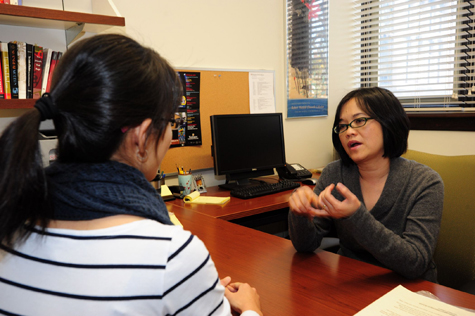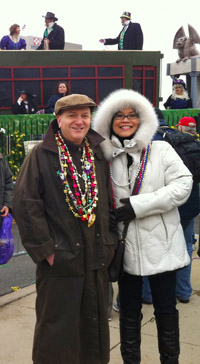
Ever since she was a young girl growing up in Taiwan in the 1960s, Lingchei Letty Chen loved art and envisioned she would go to art school.
But despite her efforts in painting and drawing lessons, Chen realized she didn’t have the talent to make a living as an artist.
Her desire to be creative took her down a different path, however — one that didn’t come into focus until her senior year of college at Tamkang University in Taipei, Taiwan.
“In my first couple years of college, I pretty much just drifted from class to class,” says Chen, PhD, now associate professor of modern Chinese language and literature in Arts & Sciences. “I didn’t have a goal.”
But that changed the semester an American literature professor at Tamkang opened her eyes to literary criticism.
“It hit me — you can be creative in scholarship. Ever since that moment of realization, I became the best student ever. I was in the library, I was reading, I was studying. I set my goal to go to the United States, get a PhD and become a literature professor.”
Since realizing that goal, she has had many opportunities to use her creativity, whether through writing, teaching, organizing international conferences or, most recently, helping launch the university’s new study abroad program at Fudan University in Shanghai. Chen is the program’s academic adviser.
Thinking ‘beyond the text’
Chen has inspired numerous students in her modern and contemporary Chinese literature courses to be creative in their own scholarship and to think critically.
“I encourage students to have their own reactions to a text that we are reading, to think, to ask good, intelligent questions,” Chen says. “I try to lead them to think beyond the text — to get into the cultural, historical and social dimensions of the text.”
She says she pushes particularly hard her graduate students — the majority of whom are from China — to ask critical questions of what they read, something they are not accustomed to coming from a state-run educational system.
“I’m trying to break their old mode of thinking — to open up and set them free,” Chen says.
Yuan Zhao, a fourth-year doctoral student in Chinese and comparative literature from Beijing, appreciates Chen’s “insightful” teaching as well as attentiveness to students’ needs.
“As international students, most of us had culture shock when we first came here,” Zhao says. “But Professor Chen has always been very patient with us. She is very generous about sharing her experiences with us.”
Her own culture shock
After graduating with a bachelor’s degree in English and American literature in 1984, Chen started looking at universities in the United States for her graduate work.
She picked Old Dominion University in Norfolk, Va., but not for any of the reasons many pick an institution.
“I liked the name,” she says, and admits the decision was “out of my pure ignorance.”
“Not confident that I could get into an Ivy League school, I didn’t even try. I thought Old Dominion sounded so classical,” she says.
“I envisioned an Oxford-esque kind of campus with 100-year old buildings in the Old South. When I got there, it was a brand-new campus, barren and no trees — all parking lot. I was so disappointed. It was my first culture shock!”
She experienced culture shock again when she started a very competitive master’s program in English literature.
“I was the only international student in my department, and a lot of my professors didn’t know what to do with me. I had trouble expressing myself in English and my writing was not very good.”
Chen decided to work on her language skills. In addition to her master’s work, she completed a certificate in teaching English as a second language (ESL).
Writing a 250-page thesis on two favorite loves — a novel and an art style — helped hone her English skills. Her thesis compared James Joyce’s Ulysses with Cubism.

Courtesy photo
Lingchei Letty Chen (right) and her husband, Mark Palmero, enjoying the Mardi Gras parade in St. Louis.
After three years of teaching ESL at Adelphi University on Long Island, N.Y., she applied to and was accepted at Columbia University.
She earned two more master’s degrees — one in modern Chinese literature, the other in comparative literature — before earning a doctorate in both in 2001. Chen joined WUSTL as an assistant professor in 2000.
Cultural identity quest
She says her 2006 book, Writing Chinese: Reshaping Chinese Cultural Identity, was very personal.
“I grew up believing I am Chinese,” says Chen, who was born under Chiang Kai-shek’s martial law. “My Taiwanese heritage was greatly undermined. When in fact my family is one of the oldest, largest families in Taiwan. Yet in school, we were taught to believe that our cultural heritage is Chinese, our home is mainland China and that we are just temporarily here in Taiwan.”
It wasn’t until she was in her doctoral program when classmates from mainland China began to challenge her cultural identity.
While she says it wasn’t hard accepting her classmates’ assertion that her cultural identity was Taiwanese — after all, her parents and grandparents were from Taiwan and her family had been in Taiwan for more than 200 years — she wouldn’t concede her “Chineseness.” How could she, she says, when her ancestors were immigrants from China?
In writing her book, she wanted to understand how one forms cultural identities. What are the elements that impact one’s sense of who they are? What is “Chineseness”?
What she found through analysis of contemporary literary texts from China, Hong Kong, Taiwan and the Chinese diaspora is that cultural identity is defined by one’s self-identity.
“Even though it is undeniable that your cultural identity is also defined by your cultural heritage, your family heritage, your nationality, in the end, however, it is you,” Chen says. “Your experience decides what your cultural identity is. There is no such thing as original, pure cultural identity. We are all cultural hybrids.”
Her book was praised for its thorough probing of the contemporary debate about cultural and ethnic identities and for addressing complex issues surrounding the claim of “Chineseness” in an increasingly borderless world.
Creating opportunities
“Letty is a great source of creative ideas,” says Robert E. Hegel, PhD, the Liselotte Dieckmann Professor of Comparative Literature and professor of Chinese and chair of the Department of East Asian Languages and Cultures in Arts & Sciences.
“As a graduate student, she organized several major conferences; since joining our faculty, she’s been a guiding light for several more, both here and in Hong Kong,” Hegel says. “Many have to do with new approaches to humanistic studies of Chinese literature and culture; they bring together some of the brightest younger scholars in China studies.”
Bringing together Chinese scholars and WUSTL students is a focus for her now. Through Washington University’s program in Shanghai with Fudan University, she is helping create opportunities for WUSTL students to study and work in China.
“Much of the growth in the next decades will take place in China and in Asia in general, and Washington University needs to provide our students with a way to take part in it,” says Jim Wertsch, PhD, the Marshall S. Snow Professor in Arts and Sciences, associate vice chancellor for international affairs and director of the McDonnell International Scholars Academy.
“For us, this means more than study abroad; it means creating a visible presence on the ground for Washington University, and Letty has been an important player in making this happen,” Wertsch says.
“The Fudan program has been very challenging, but it’s also been very fulfilling to me,” Chen says. “I like to create things. Creating a program that can be beneficial to students and faculty is very satisfying.”
Fast facts about Letty Chen
Titles: Associate professor of modern Chinese language and literature, Department of East Asian Languages and Cultures, with appointments in International and Area Studies and Comparative Literature, all in Arts & Sciences; head of the Chinese Section; and academic director, Washington University in Shanghai (in affiliation with Fudan University)
Family: Married to Mark Palmero, a real estate broker who owns his own real estate company. Chen’s parents, brother and sister all immigrated to the United States from Taiwan.
Down time: Loves to travel, visit art museums and galleries and go to movies. “I used to love art films but now am more interested in popular culture films and keeping myself in touch with mainstream American culture,” she says.
Dream trip: “I would love to go to Morocco; I’ve never been to that corner of the world,” she says.